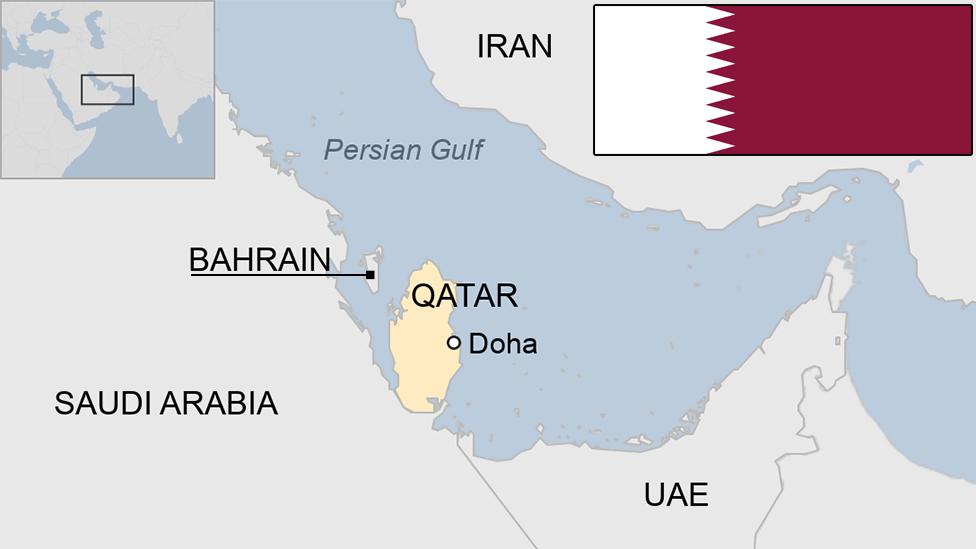Qatar: A country of seemingly ironic contrasts
- Published
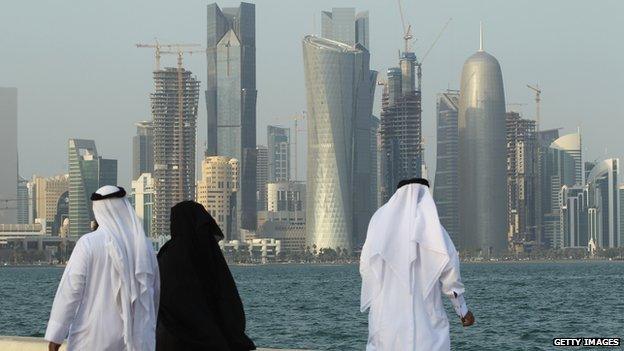
The Emir of Qatar did something almost unheard of this week when he abdicated in favour of his son. What kind of state has 33-year-old Sheikh Tamim Al-Thani - the Middle East's youngest ruler - inherited?
"So let me get this straight," I said to Qatar's Prime Minister, at the start of our interview.
"You disapprove of many of America's policies in the Middle East, yet you are hosting the Pentagon's biggest military base in the region?"
There was a pause, and a slow smile.
"It's true," he replied, "but we own the keys to the base."
That conversation was over a decade ago and now Qatar has a new ruler and a new prime minister.
The place has changed almost beyond recognition from the torpid Gulf backwater I first visited in the early 1990s.
Steel and chrome skyscrapers have shot up where there used to be nothing but desert.
Using its vast wealth from offshore gas deposits, the once sleepiest and slowest of all six Gulf Arab states has recently fast-tracked itself to become an economic powerhouse.
All very impressive for a country with fewer than 500,000 Qatari citizens.
So there is no mistaking, Qatar is rich. But it is also a country of seemingly illogical contrasts.
Take the Taliban. Qatar generously offered to host their office for peace negotiations which opened amid confusion and recriminations from Kabul.
Most of the fuss centred on the Taliban's flag that they were not supposed to put up. It was inside their perimeter walls but outside their office.
After a rap on the knuckles from the Qataris the Taliban took it down, but then, when they thought no-one was looking, they put it back up again - this time on a shorter flagpole.
I could see it clearly, flapping in the oven-hot breeze of early afternoon. After howls of protest from the Afghan government in Kabul it was taken down again.
Now, the Taliban are a hardline Islamist movement, usually associated with Afghanistan's long-running insurgency and the disavowal of almost all earthly pleasures.
Yet it turns out that its representatives have been in Qatar for quite some time and have adapted remarkably well to the lotus life in the Gulf.
"You can see them any weekend," one local resident told me. "They go shopping in City Centre Mall. They have even had babies out here."
Less than an hour's drive from the Taliban's smart new villa in Doha lies the giant US-run airbase of Al-Udaid.
This is where most of the coalition's air operations in Afghanistan are co-ordinated from and it is strictly off limits to visitors.
When a frontline combat unit on the ground in, say, Helmand province, radios its base for air support, the request then gets routed through Qatar.
So just a short distance from the very building where Afghan peace talks may eventually get underway, coded signals are being dispatched that send Apache helicopter gunships or F16 jets into action against the Taliban.
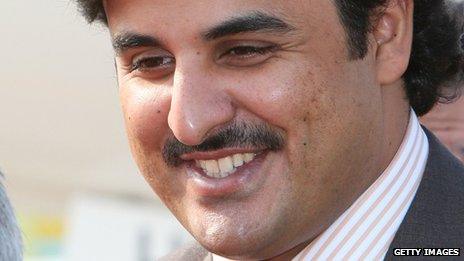
Sheikh Tamim Al-Thani takes over a country enjoying its new-found clout
Then there is the question of Israel. As an Arab and Muslim nation, home to the satellite TV station Al-Jazeera, Qatar has played host to plenty of Israel's noisiest and most vitriolic detractors.
And yet unknown to most people, Israel had a discreet trade office in Qatar that only closed as recently as 2009 after its military incursion into Gaza.
The ironies do not end there.
Of all the Gulf countries, Qatar is closest to the Muslim Brotherhood, the Islamist organisation that has swept to power in Egypt.
It is home to its spiritual figurehead, the populist preacher Yousef Al-Qaradawi.
Yet Qatar, which used to impose a strict ban on alcohol, does have some well-stocked bars if you know where to go.
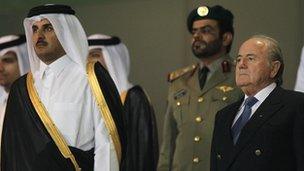
Sepp Blatter has refused to state whether he backed the decision to hold the 2022 World Cup in Qatar
Steering a middle course between the demands of the country's more devout citizens, who oppose such creeping western immoralities, and those who want to open up this tiny country further to the outside world - will be one of the major challenges facing the new Emir.
Sheikh Tamim Al-Thani may have only just turned 33, but he has spent the last 10 years training to take over from his father and Qataris have been quick to pledge their allegiance.
He has been instrumental in helping the emirate punch above its weight on the international stage, supporting rebels first in Libya and then in Syria.
This new-found clout, backed by fabulous wealth, is already making neighbouring states nervous.
Some fear it may be over-reaching itself in helping to fuel a conflict with no end in sight. But Qatar has come a long way in a short time.
Not that long ago I remember Egypt's now-deposed President Mubarak complaining, during a spat with Qatar's ruler: "Why should I pay attention to a country with the population of a small hotel?"
People are certainly paying attention to it now.
How to listen to From Our Own Correspondent, external:
BBC Radio 4: Saturdays at 11:30 and some Thursdays at 11:00
Listen online or download the podcast.
BBC World Service: Short editions Monday-Friday - see World Service programme schedule.
You can follow the Magazine on Twitter, external and on Facebook, external
- Published26 June 2013
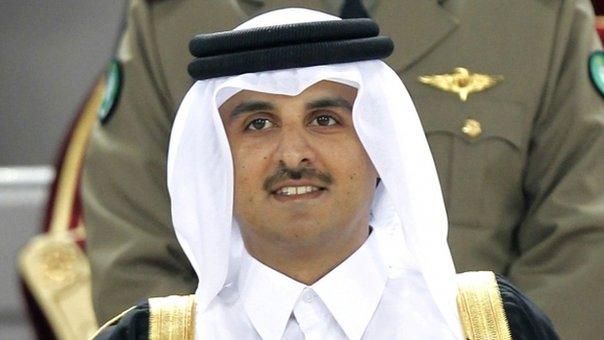
- Published25 June 2013
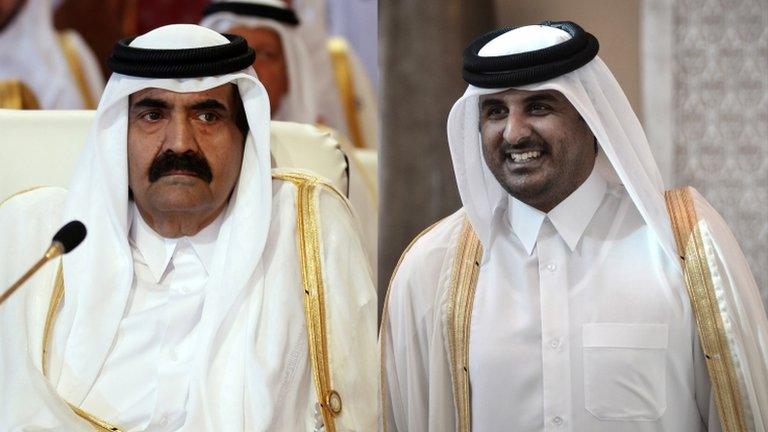
- Published25 June 2013
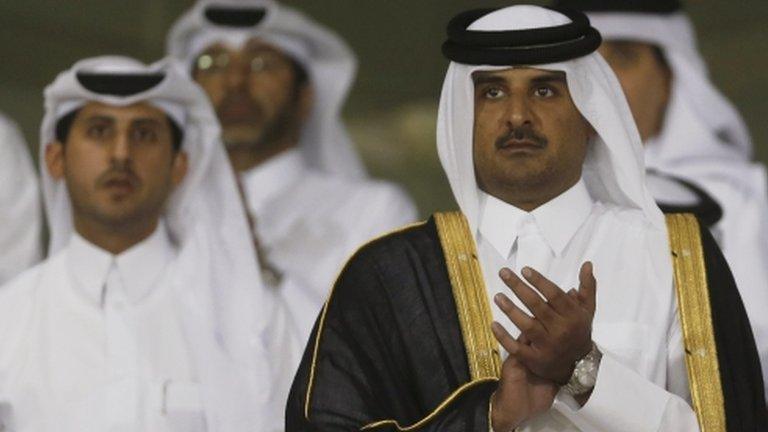
- Published7 September 2023
